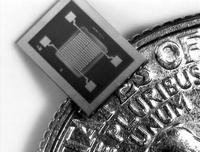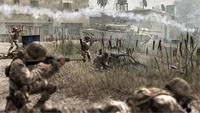-
Syria’s chemical weapons stocks will not be attacked
Military analysts say Syrian president Bashar Assad will emerge with Syria’s chemical arsenal intact if the United States executes a limited airstrike. The United States contemplates a punitive strike in response to Syria’s use of chemical weapons against Sunni civilians on 21 August – and on about a dozen earlier occasions – but the U.S. attack, if it comes, is not likely to include the depots where the chemical weapons are stored because such an attack may release deadly gases which would cover the neighboring areas with toxic clouds, potentially creating a human and environmental disaster.
-
-
New detectors for chemical, biological threats

In the late 1990s, Sandia scientists developed a simple-to-use handheld chemical detector for the military, the MicroChemLab. Ever since, Sandia has improved such microfluidics- and microelectromechanical (MEMS) systems-based instruments that identify chemicals based on gas chromatography, or GC, and resonator-style instruments such as surface acoustic wave (SAW) detectors. The lab’s researchers are building on this sensor work to invent tiny detectors that can sniff out everything from explosives and biotoxins to smuggled humans.
-
-
Worries grow about Syria’s biological weapons capabilities, intentions
The debates among experts in Western and Middle Eastern intelligence services and militaries about the use of chemical weapons by the Assad regime revolve around how many times Assad has used chemical weapons, not whether such weapons were used. Neighbors of Syria have become increasingly alarmed – and, in private, have expressed their anxiety in discussions with the United States – about another illicit Syrian WMD program: biological weapons. The readiness of the Assad regime to use one proscribed weapon – chemicals — has led to growing unease among Syria’s neighbors that the regime may not find it too difficult to violate other weapon-related taboos. Biological weapons could give the Assad regime an effective means of retaliation because, if the weapon is well-designed, the lethal contents would spread easily without leaving tell-tale signs about the origin of the attack – or even evidence that there has been an attack.
-
-
Administration's Syria plan: limited operation with “downstream” effect
Three leading administration officials yesterday presented, in general detail, the plan of attack on Syria. The plan emphasizes the destruction of delivery vehicles – missiles, rockets, planes and their airfields, and artillery pieces – used in the delivery of chemical weapons. The three officials – Kerry, Hagel, and Dempsey — agreed that such an attack, even if its purpose would be to degrade the regime’s ability to deliver chemical weapons, would have “downstream” effect: these delivery vehicles also deliver conventional munitions, so their destruction would more generally degrade the regime’s ability to fight, thus making the battlefield between the regime and the rebels more level. The Senate Foreign Relations Committee is today drafting a new resolution which would permit up to ninety days of military action against the Syrian government and bar the deployment of U.S. combat troops in Syria but permit the deployment of a small rescue mission in the event of an emergency. The White House also would be required within thirty days of enactment of the resolution to send lawmakers a plan for a diplomatic solution to end the violence in Syria.
-
-
Lawmakers mull oversight of U.S. cyberattack capabilities and operations
There has not yet been a public discussion of U.S. offensive cyberattack capabilities — and of actual U.S. cyberattacks — and the subject had been classified until a few years ago. Even after the subject came more into the open, only the fact that the United States had the capability to initiate offensive cyberattacks was acknowledged. With the growing attention to cyber operations – both defensive and offensive — the question of oversight is set to follow.
-
-
Kerry leaves no doubt: U.S. will attack Syria within days, no UN approval sought
In a speech today, Secretary of State John Kerry left no doubt that the Obama administration, within days at most, will launch a series of attacks against the Assad regime for attacking Syrian Sunni civilians with chemical weapons. The chemical attack – not the first one by the regime this year — killed 1,429 people, including 426 children. Kerry said punishing the offending regime was not only the right thing to do morally, but it is essential to protect U.S. national interest and the interests of U.S. allies. The administration has circulated a report, prepared by the U.S. and U.K. intelligence communities, detailing the evidence pointing to the Assad regime’ responsibility for the chemical attack. Kerry: we “make our own decisions on our own timelines, based on our own values and interests”
-
-
British Parliament vote complicates U.S. Syria plans (updated)
In a heavy defeat to Prime Minister David Cameron, the British Parliament voted against British military contribution to or involvement in an attack on Syria in response to the Assad regime’s use of chemical weapons last week. The vote is an embarrassing defeat for Cameron, and a major set-back for President Obama’s plan to put together a coalition of the willing to strike military targets in Syria. The parliamentary vote has no military significance, as the British contribution to the actual military operations would have been minimal at best. The U.K. vote, rather, is a political blow to the United States as it highlights on-going skepticism among Western publics – including U.S. public opinion — about yet another Western military involvement in the Middle East. The British vote is a blow to the United States more generally, as Britain has been the U.S. most loyal ally, and has taken part in every major U.S. military offensive in recent years.
-
-
U.S. military doubts purpose, efficacy of U.S. strike on Syria
The Obama administration’s plan to attack military targets in Syria is not greeted with enthusiasm by a U.S. military still carrying the scars of military involvement in Iraq and Afghanistan and facing deep budget cuts.Many in the military have reservations about a military action in Syria, with the main reservations concerning the potential unintended consequences of launching cruise missiles against Syria. Both supporters and opponents of a strike on Syria, though, agree on one thing: “Remember, with respect to policy choices concerning Syria, we are discussing degrees of bad and worse,” one officer said.
-
-
New analysis suggests war has not disappearing

While some researchers have claimed that war between nations is in decline – see, for example, Steven Pinker’s 2011 book The Better Angels of Our Nature: Why Violence Has Declined — a new analysis suggests we should not be too quick to celebrate a more peaceful world. New study finds that there is no clear trend indicating that nations are less eager to wage war. Conflict does appear to be less common than it had been in the past, but this is due more to an inability to fight than to an unwillingness to do so.
-
-
British MPs vote against U.K. military participation in attack on Syria
In a heavy defeat to Prime Minister David Cameron, , the British Parliament voted against British military contribution to or involvement in an attack on Syria in response to the Assad regime’s use of chemical weapons last week. The vote is an embarrassing defeat for Cameron, and a major set-back for President Obama’s plan to put together a coalition of the willing to strike military targets in Syria. The parliamentary vote has no military significance, as the British contribution to the actual military operations would have been minimal at best. The U.K. vote, rather, is a political blow to the United States as it highlights on-going skepticism among Western publics – including U.S. public opinion — about yet another Western military involvement in the Middle East.
-
-
UN withdraws inspectors from Syria ahead of schedule
UN secretary-general Ban Ki-moon has instructed the UN weapons inspectors investigating last Wednesday’s chemical weapons attack to leave Syria by Saturday. The withdrawal of UN inspectors in the face of an imminent military campaign is reminiscent of other instances of early departures of UN weapons inspectors from Iraq in December 1998. The Clinton administration tipped the inspectors off that missile strikes against Saddam Hussein’s regime were imminent.
-
-
Divisions in U.K. over Syria action
A U.S.-led attack on Syrian targets in response to the Syrian military’s use of chemical weapons in an attack on Sunni civilians last Wednesday may be delayed until next week in the face of strong opposition in the U.K. parliament to British involvement. Prime Minister David Cameron said MPs would be given a second vote to approve military action ahead of a Commons debate today (Thursday) on Syria, in order to defuse a parliamentary revolt. About seventy Tory MPs said they would join the Labor opposition in voting against the U.K. participating in the attack on Syria. Some of the opponents of U.K. participation say a UN approval of such an attack would be needed, while others say they want to see clear-cut proof of the Assad regime’s culpability.
-
-
Pentagon not likely to attack Syria’s chemical weapons depots
Administration officials say that the coming U.S. military strike against Syria – and it may be launched as early as tomorrow, Thursday – will aim not to change the regime, but to punish the Assad regime for using chemical weapons, and “deter and degrade” the ability of the regime to launch chemical weapons in the future. The attack will not be focused on chemical weapons storage sites, as American officials fear that such an attack may release clouds of toxic clouds into the air, possibly causing humanitarian and environmental disaster. Israeli intelligence analysts disagree, pointing out that the components of the chemical weapons are stored separately and assembled when an order is given – meaning that a strike on a chemical weapon storage facility will not trigger a chemical reaction. Whether or not Israel has been able to persuade the United States on this issue remains to be seen, but one thing is clear: if Assad decides to retaliate against Israel in the wake of an American strike on Syria, Israel will not hesitate to attack these storage facilities.
-
-
Cruise missile-only strikes have mixed record of success
If the United States limits its operation in Syria to cruise missile strikes, the operation will resemble similar attacks in the past – for example, cruise missile attacks in Afghanistan, Sudan, and Iraq in 1998. Cruise missile-only operations have had at best a mixed record of success. Experts note that Tomahawk missile strikes are politically and psychologically significant, but typically have a limited tactical effect.
-
-
New technology improves IED detection

Improvised explosive devices, or IEDs, are homemade bombs that can both injure and kill civilians and service members. One solution to the problem of IEDs is to find them before they explode by detecting the chemicals used in the explosives. Scientists at the U.S. Naval Research Laboratory (NRL) have developed a technology, using silicon to fabricate a sensor that may revolutionize the way trace chemical detection is conducted
-
More headlines
The long view
Tantalizing Method to Study Cyberdeterrence
Tantalus is unlike most war games because it is experimental instead of experiential — the immersive game differs by overlapping scientific rigor and quantitative assessment methods with the experimental sciences, and experimental war gaming provides insightful data for real-world cyberattacks.
Testing Cutting-Edge Counter-Drone Technology
Drones have many positive applications, bad actors can use them for nefarious purposes. Two recent field demonstrations brought government, academia, and industry together to evaluate innovative counter-unmanned aircraft systems.
European Arms Imports Nearly Double, U.S. and French Exports Rise, and Russian Exports Fall Sharply
States in Europe almost doubled their imports of major arms (+94 per cent) between 2014–18 and 2019–23. The United States increased its arms exports by 17 per cent between 2014–18 and 2019–23, while Russia’s arms exports halved. Russia was for the first time the third largest arms exporter, falling just behind France.
How Climate Change Will Affect Conflict and U.S. Military Operations
“People talk about climate change as a threat multiplier,” said Karen Sudkamp, an associate director of the Infrastructure, Immigration, and Security Operations Program within the RAND Homeland Security Research Division. “But at what point do we need to start talking about the threat multiplier actually becoming a significant threat all its own?”
The Tech Apocalypse Panic is Driven by AI Boosters, Military Tacticians, and Movies
From popular films like a War Games or The Terminator to a U.S. State Department-commissioned report on the security risk of weaponized AI, there has been a tremendous amount of hand wringing and nervousness about how so-called artificial intelligence might end up destroying the world. There is one easy way to avoid a lot of this and prevent a self-inflicted doomsday: don’t give computers the capability to launch devastating weapons.
